I’ve been rewatching a lot of Star Trek: Deep Space Nine recently. You might have seen the Complete Dominion War Guide I put together. Undoubtedly, The Dominion play a huge role in the series, but DS9 also has some amazing non-Dominion episodes worth watching.
“The Visitor” is one of those amazing episodes. If you are a fan of DS9, this probably isn’t news to you. It’s often cited as one of the best episodes of the series. So I thought I would take another look at this great episode, break it down, and talk about why it’s so highly revered.
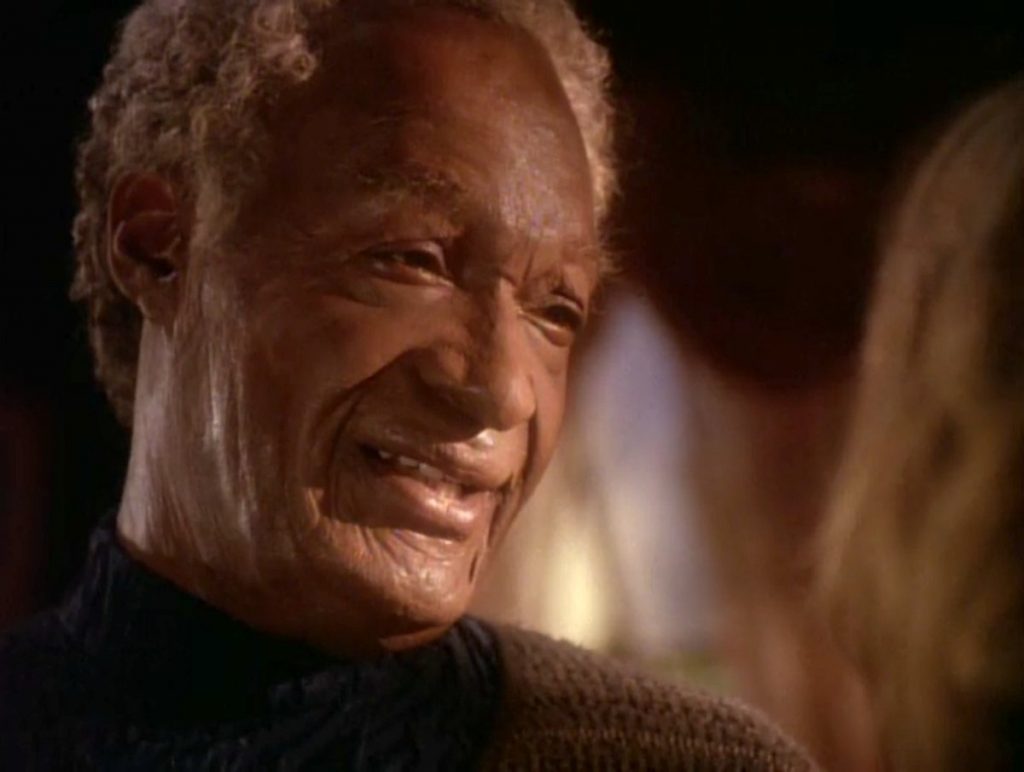
It Begins Many Years Ago
The first time I saw “The Visitor”, I didn’t appreciate the episode. I was much younger and was mostly watching the show for stuff related to The Dominion. I wanted to see Jem’Hadar, not old Jake Sisko dealing with father issues.
But as I grew older and found a new perspective on life, the greatness of “The Visitor” became apparent to me. Here was a story about a father and a son, grief and moving on, suffering and hope, life and death. And not to mention it’s all wrapped up in a lovely science fiction bow.
The idea for the episode apparently came from a famous J.D. Salinger interview. A known recluse who would rarely be seen in public, he ended up giving an interview to a random high school student who showed up at his door. This idea provided the basis for “The Visitor”, in which a young writer happens upon an aged Jake Sisko (played by Tony Todd, intentionally or not doing his best Joseph Sisko impression) on a very important night in his life.
Jake recounts a story to the young writer, Melanie, about the supposed death of his father, Benjamin Sisko. After an accident aboard the Defiant, Benjamin Sisko disappears and is assumed dead. Months later, as Jake tries to move on, his father briefly reappears. This happens again years later. Eventually, it is discovered that Jake is pulling his father through time and the only way to save him is to “cut the cord”. Jake, now an old man, sacrifices himself so that his father can return to his original time and prevent the whole incident from occurring.
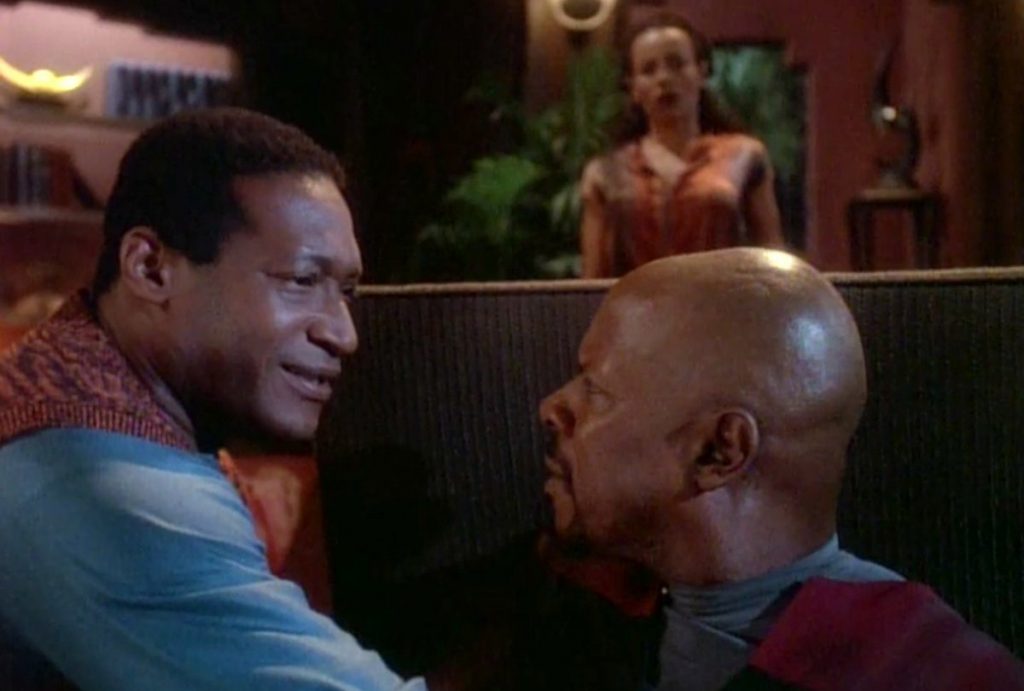
Future Imperfect
As often occurs in Star Trek, the episode is similar to other incarnations of the series, such as The Next Generation’s “The Inner Light”, Voyager’s “Year of Hell”, and Enterprise’s “Twilight”. In each episode, we see characters lives through a long span of time (years to decades) only for it to be undone in the end.
“The Visitor” leans much closer to “The Inner Light” than it does the other episodes. In both “Year of Hell” and “Twilight”, our characters have no memory of the reversed events happening. While these are both great episodes, the lack of remembrance certainly takes away any emotional impact. They went through some bad stuff and then they forgot.
“The Inner Light” is of course a Star Trek classic, where Picard lives the rest of his life in a simulation of a lost culture. When that simulation ends, he wakes up in his normal body, having truly lived another life. He can’t forget this and it leaves lasting effects. This is similar to DS9‘s “Hard Time” as well, where O’Brien serves a 20-year prison sentence, but only in his mind.
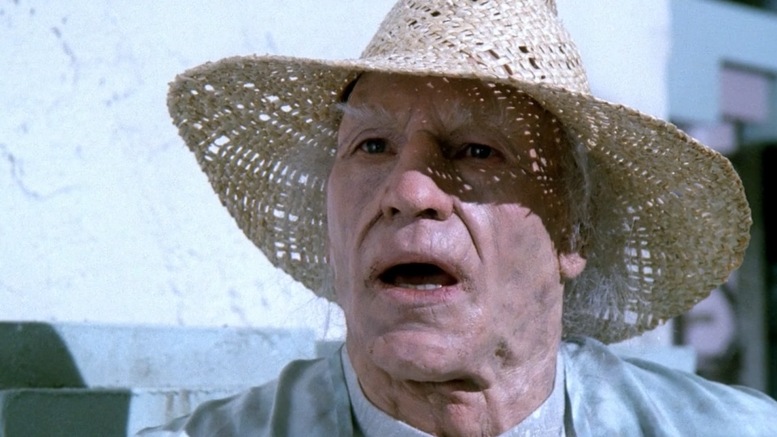
What makes “The Visitor” unique though is that it isn’t Jake Sisko who remembers the events, but it is his father, Benjamin Sisko, who remembers. Ben is the one who has to live with all the pain, all the suffering, and all the sacrifices his son made for him.
This father/son relationship is so unique to the DS9 series. It is established from the very first episode “Emissary” as an important theme of the show. Sisko and his son Jake, trying to find a new home on DS9 in the wake of Jennifer Sisko’s death. It is one of the things that attracted Avery Brooks to the role of Sisko.
Backwards and Forwards
There is a scene in “The Visitor” of Kira consoling Jake on the loss of his father. It’s a touching scene that shows the role Kira plays in the life of the Sisko family. We see a very similar shot unfold in final shot of the series in “What You Leave Behind”. Jake once again left without his father is being consoled by Kira. Say what you will about where the series left Jake, the shot is a nice throwback to “The Visitor” to wrap up the series.
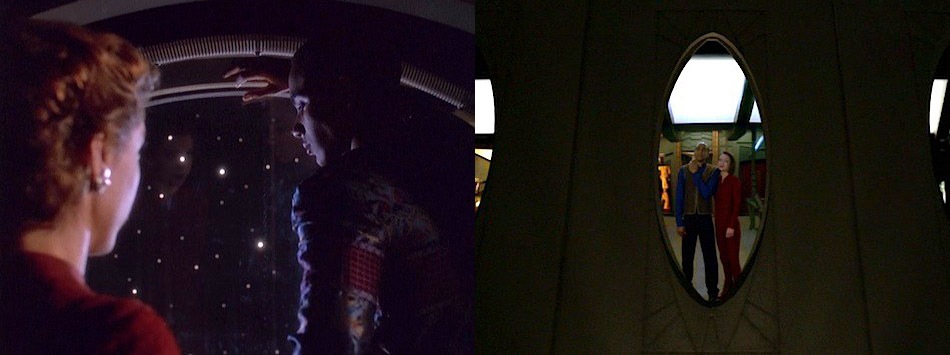
And that isn’t the only bit of cool continuity in the episode. In what are always fun scenes, we get to see various future versions of characters wearing uniforms last seen in TNG’s “All Good Things”. And aged Dax and Bashir squabble like an old married couple. It seems to hint they may have finally gotten together, but with Dax’s line of “your kids” to Bashir, it’s hard to confirm either way.
To My Father, Who’s Coming Home
The idea of “home” plays an important role within the episode. We see how Jake has grown to see Deep Space Nine as his home, even after his father is taken away from him. As tensions with the Klingons rise in the future, Jake fights to stay on the station as long as possible. When he is forced to leave, he is eventually able to make a new home on Earth. But this too falls apart when he dedicates his life to saving his father.
It is clear throughout the episode that Jake links the idea of “home” with his father. Jake and his father found a new home together on DS9 and he does not want to leave that, and his father’s memory, behind. As he begins to move on and create a new home on Earth, his father briefly reappears. In this case, Jake feels guilt. Guilt for moving on (establishing a new home) when he could have been searching for this father.
The emotional arc that Jake goes through during the episode is staggering. Grief over his father’s supposed death. Momentary happiness over his father’s return. Sadness at his leaving again. Acceptance and moving on that is short circuited by guilt. An ultimate drive to save his father fueled by many of these things. And in the end, Jake is able to salvage some of his life before making the ultimate sacrifice to save his father.
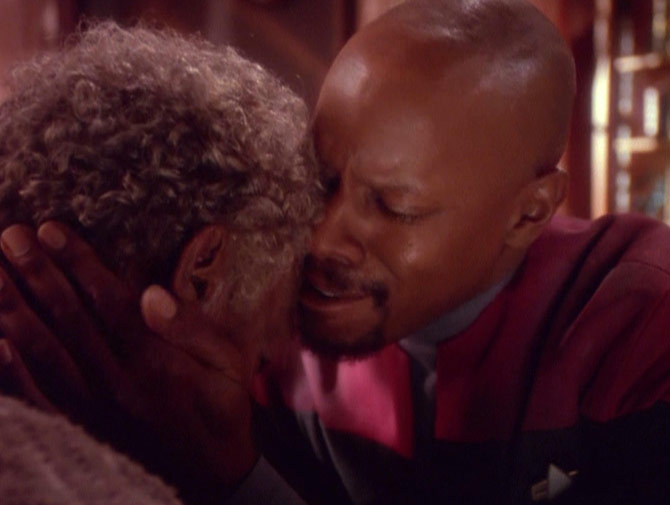
We’re Going to Get a Second Chance
Honestly, it is crazy to me how much and how well so many things are packed into one episode and we haven’t even touched on two of the biggest points: life and love.
Jake loves his father so much that he is willing to sacrifice his life. He sacrifices his happiness, his work, his marriage, and eventually his actual existence. Jake does all of this for his father, for whom he loves more than anything.
Benjamin’s love for Jake manifests a similar way, in that he loves his son so much he doesn’t want Jake to give up his life. In the brief scenes in which Sisko appears to his son, Avery Brooks plays the perfectly calm father consoling his son, wanting to hear about his life and simply urging his son to enjoy it. It pains Sisko to see his son unable to move on. Of course he wants to be together with Jake, but Sisko is willing to sacrifice that for his son to be happy.
This dichotomy is key to the episode, with Jake representing love and Sisko representing life. And while the ending leans towards a “love conquers all” message, I don’t think for a minute “The Visitor” is advocating sacrificing your life in the name of love. In one of the final scenes, we learn that Jake has begun writing again and leaves his works to Melanie. Before she leaves, he recounts his father’s quote and tells her to live her life.
“I’m no writer; but if I were, it seems to me I’d want to poke my head up every once in a while and take a look around; see what’s going on. It’s life, Jake! You can miss it if you don’t open your eyes.”
– Benjamin Sisko
Despite Jake’s sacrifice at the end, he ultimately did learn the lesson his father was teaching him. You have to live your life. There are so many important things you will miss if you don’t just take a break from your work and look around. It took Jake many years to learn that. Years in which he could have started a family (which he clearly wanted). Years he could have been happy. And while he rediscovered his life in his older years, he also realizes how much he missed.
Life and love are two of the biggest concepts of the human existence and “The Visitor” tackles them both excellently. There are so many interesting intricacies found throughout the episode, it’s hard to believe this was simply a random episode of DS9. But sometimes everything falls together and you get an amazing piece of television.
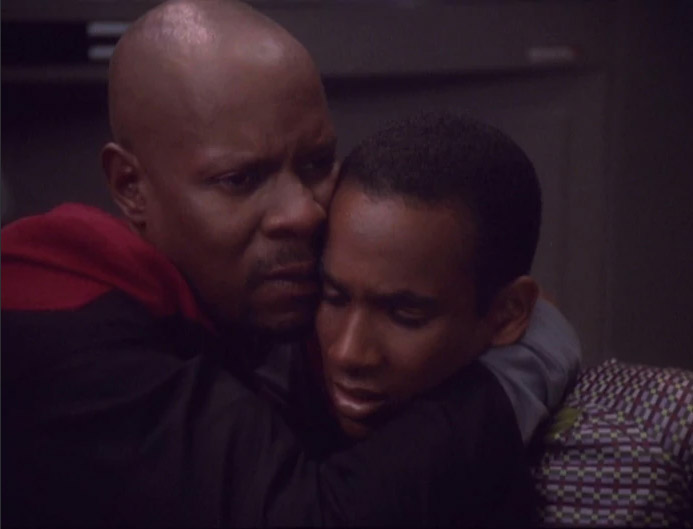
In Which I Get Old
Earlier I mentioned that I didn’t appreciate “The Visitor” when I was younger. I wanted to come back to that. One of the things that I find so interesting as I get older is how much more emotionally affected I am by media.
When I was young, things like TV, film, books, were just entertainment. I enjoyed them immensely, but it was rare that they produced any sort of emotional response. But as I grew older, and my world view grew as well, I began to understand why my mom cried all the time to movies.
When I watch Jake go through his unending suffering and sacrifice, what affects me isn’t necessarily what I am seeing on the screen, but knowing that these are real things that real people feel. I’m lucky enough to still have both of my parents, but I have certainly felt grief and loss. I can only imagine what it would be like to lose my own father.
The images on the screen are just that, lights and sounds. But now they represent a greater life than the one I lived as a child. A life filled with a multitude of experiences, both happy and sad, that I couldn’t conceive of when I was younger. It is these things that make “The Visitor” such a rich experience and one that I couldn’t appreciate until I was older.
“The Visitor” is an emotionally powerful episode of television. Not only is it one of my favorite episodes of Deep Space Nine, it is one of my favorite episodes of television period. Do yourself a favor, block out 45 minutes of your day, grab some tissues, and watch “The Visitor”.
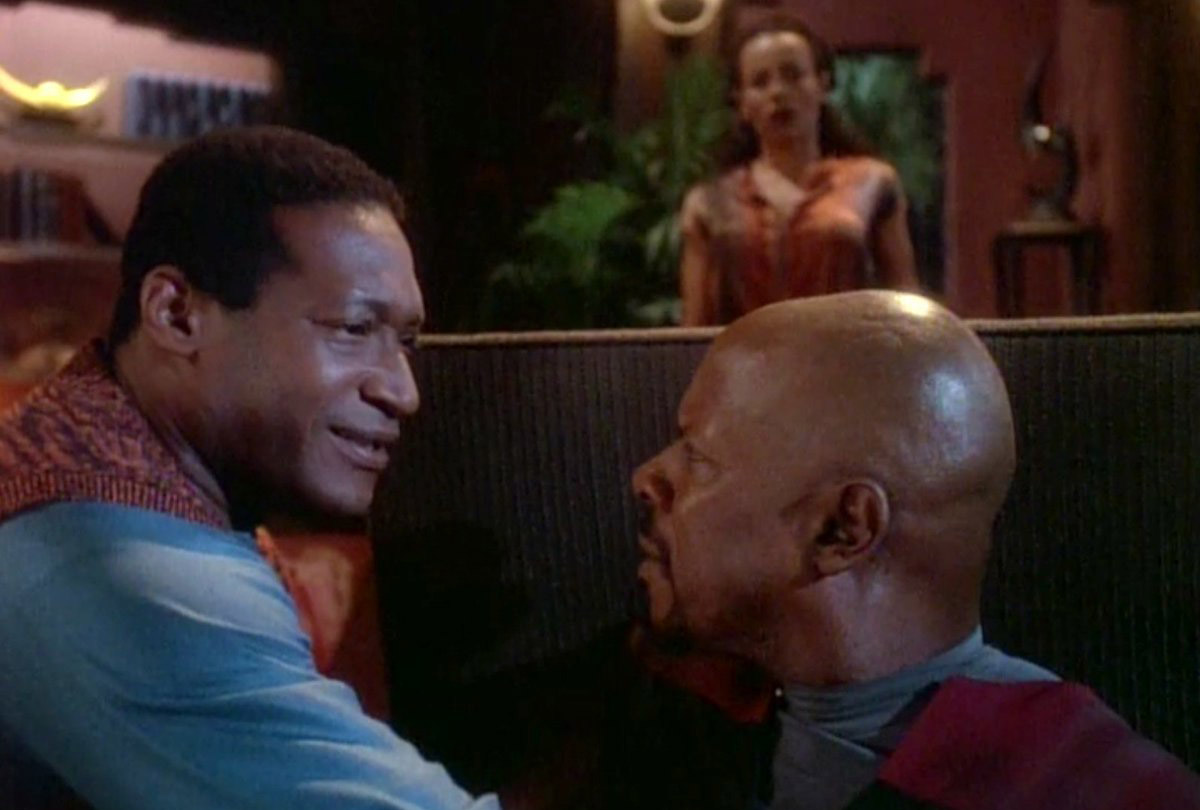
One Reply to “DS9 Rewatch: The Visitor”